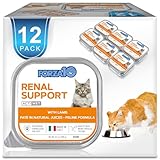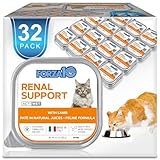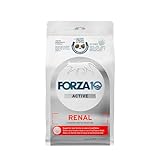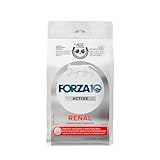Caring for a feline companion with renal health issues requires special dietary considerations to support their well-being. Choosing the best renal cat food is crucial to managing their condition and improving their quality of life. In this comprehensive guide, we will explore top-rated renal cat food options tailored to meet the specific nutritional needs of cats with kidney concerns. Discover key features, benefits, and expert reviews to make an informed decision when selecting the best renal cat food for your beloved pet.
Get ready for our reviews on the best renal cat food, but first, here are some related Amazon products to check out:
Last update on 2026-01-23 at 05:52 / Paid links / Images from Amazon Product Advertising API
Understanding Renal Cat Food
Renal cat food is specially formulated to support the unique dietary needs of cats with kidney problems, also known as renal disease or chronic kidney disease (CKD). Cats with kidney issues require a diet that is low in certain nutrients like phosphorus and protein, while also providing essential vitamins, minerals, and high-quality protein sources. Renal cat food aims to alleviate the workload on the kidneys and slow down the progression of the disease.
These specialized cat foods often have controlled levels of phosphorus to reduce strain on the kidneys and minimize the risk of further damage. They also typically contain high-quality proteins that are easier for the kidneys to process, helping to reduce the buildup of toxins in the bloodstream. Additionally, renal cat foods may have added omega-3 fatty acids to support kidney function and overall health.
It is important for owners of cats with kidney issues to work closely with their veterinarian to determine the most appropriate renal cat food for their pet’s specific condition and stage of kidney disease. This can help improve the quality of life for the cat, manage their symptoms, and potentially slow down the progression of the disease. Renal cat food is an essential tool in the management of feline kidney disease, providing targeted nutrition to support kidney function and overall health.
Best Renal Cat Food
01. Hill’s Prescription Diet k/d Kidney Care
Designed for cats with kidney issues, Hill’s Prescription Diet k/d Kidney Care is a specialized formula that supports kidney function and helps manage related health problems. With a blend of essential nutrients and controlled levels of high-quality protein, this prescription diet promotes a healthy urinary environment and aids in preserving muscle mass. Its balanced levels of phosphorus and sodium help protect the kidneys from further damage, while omega-3 fatty acids support overall kidney health.
Vet-recommended and clinically tested, Hill’s Prescription Diet k/d Kidney Care offers a convenient solution for feline kidney health management. Pet owners appreciate its effectiveness in improving their cats’ quality of life by addressing kidney issues and providing tailored nutrition for better kidney function.
Pros
- Supports kidney function in cats with kidney disease
- Controlled phosphorus levels to support kidney health
- Contains high-quality protein for muscle support
- Balanced nutrition with essential vitamins and minerals
- Helps manage symptoms of kidney disease
- Recommended by veterinarians for kidney care
Cons
- Expensive compared to regular cat food.
- Limited availability in local pet stores.
02. Royal Canin Renal Support D
Ideal for cats with kidney issues, Royal Canin Renal Support D is a highly recommended dietary solution. With its carefully crafted formula, it supports renal function and helps manage the progression of chronic kidney disease. The blend of nutrients in this food promotes optimal hydration and encourages a healthy appetite, crucial for cats struggling with kidney issues.
Clients have reported positive outcomes, noting an improvement in their cats’ overall well-being and energy levels. The palatable taste of the kibble ensures even picky eaters will enjoy it, making mealtime stress-free for both cats and their owners. Royal Canin Renal Support D provides peace of mind for pet owners seeking the best for their feline companions’ kidney health.
Pros
- Formulated to support kidney function in dogs.
- Contains essential nutrients to help manage renal issues.
- Helps maintain healthy blood pressure.
- Supports urinary tract health.
- Clinically proven to improve quality of life in dogs with kidney disease.
Cons
- Relatively expensive compared to other kidney support diets.
- Some cats may not like the taste or texture of the food.
03. Purina Pro Plan Veterinary Diets NF Kidney Function
Designed to support feline kidney function, Purina Pro Plan Veterinary Diets NF Kidney Function offers a scientifically formulated solution for cats with renal issues. With low phosphorus levels and restricted protein content, this specialized diet helps manage progression of kidney disease, promoting overall kidney health. The added omega-3 fatty acids and potassium are beneficial for supporting renal function and maintaining a healthy balance.
This veterinary diet comes highly recommended by veterinarians for its effective approach in managing kidney disease in cats. Cats enjoy the palatable flavors and pet owners appreciate the peace of mind knowing they are providing their furry companions with the necessary nutrition to support their renal health.
Pros
- Specifically formulated for cats with kidney disease
- Controlled phosphorus levels to support kidney function
- Enhanced palatability for picky eaters
- Contains omega-3 fatty acids to support kidney health
- Veterinarian recommended formula
Cons
- High cost compared to non-prescription pet foods.
- Limited availability at retail stores, often requiring purchase through a veterinarian.
- Not suitable for all dogs, may require consultation with a vet before use.
04. Blue Buffalo Natural Veterinary Diet KS Kidney Support
Developed specifically for cats in need of kidney support, Blue Buffalo Natural Veterinary Diet KS Kidney Support is a premium choice for feline caregivers. Crafted with real ingredients like fish oil, antioxidants, and essential nutrients, this specialized formula promotes kidney health while providing a delicious meal for your cat. Veterinarian-approved and grain-free, it addresses the dietary needs of cats with kidney issues without compromising on taste or quality.
With a focus on supporting renal function and promoting overall well-being, Blue Buffalo Natural Veterinary Diet KS Kidney Support offers a holistic approach to managing kidney disease in cats. The carefully selected ingredients work together to maintain a healthy urinary tract and improve kidney function, making it a reliable option for cat owners looking to provide their furry companions with the best possible care for their kidney health.
Pros
- Formulated specifically for kidney support
- Contains controlled levels of high-quality protein
- Enhanced with omega-3 fatty acids
- Supports kidney function through targeted nutrition
- Helps manage kidney health in cats with kidney issues
- Developed by veterinarians and nutritionists
Cons
- Expensive compared to other kidney support cat foods.
- Some cats may not like the taste and refuse to eat it.
05. Iams Veterinary Formula Renal Plus
Designed for cats with kidney-related issues, Iams Veterinary Formula Renal Plus provides a specialized diet to support renal function. With a balanced blend of nutrients, this vet-recommended formula helps manage kidney disease and promote overall health. The low phosphorus content minimizes strain on the kidneys, while omega-3 fatty acids support kidney function and heart health. Cats find the taste palatable, making it easier for owners to ensure their feline companions receive the necessary nutrition for their unique health needs. Give your cat the support they need with Iams Veterinary Formula Renal Plus for improved renal health and well-being.
Pros
- Formulated specifically for cats with kidney issues.
- Contains high-quality proteins to support kidney function.
- Helps manage the progression of chronic kidney disease.
- Includes a blend of vitamins and antioxidants for overall health support.
- Available by prescription for personalized care.
Cons
- Expensive compared to other renal support diets.
- Some cats may not like the taste of the food.
Understanding the Importance of Renal Cat Food for Feline Health
Renal cat food is a specialized type of feline diet designed to support cats with kidney issues. Cats are prone to developing kidney problems as they age, making it crucial for pet owners to provide them with the best renal cat food available. This type of cat food has a specific formulation that helps reduce the workload on the kidneys and promotes overall kidney health.
One of the main reasons why people need to buy renal cat food is to manage and support their cat’s kidney function. The ingredients in renal cat food are carefully selected to be easier for the kidneys to process, reducing the strain on these vital organs. By feeding their cats the best renal cat food, pet owners can help slow down the progression of kidney disease and improve their cat’s quality of life.
Another important aspect to consider is that renal cat food is formulated to be highly palatable. Cats with kidney issues may have a decreased appetite, so it’s essential to provide them with food that they will enjoy eating. The best renal cat food options are designed to be flavorful and enticing to encourage cats to eat an adequate amount to support their health.
In conclusion, buying renal cat food is essential for cat owners whose feline companions have kidney problems. Providing the best renal cat food can make a significant difference in managing and supporting a cat’s kidney health, ultimately helping them lead a healthier and more comfortable life.
Choosing the Right Renal Cat Food
Key factors to consider when choosing the right renal cat food include the cat’s specific dietary needs, high-quality protein sources, low phosphorus levels, balanced nutrition, and palatability. By focusing on these essential elements, you can ensure that your cat receives the best possible care and support for their renal health.
Low Phosphorus Content
Considering the phosphorus content in renal cat food is crucial for maintaining the kidney health of cats with renal issues. High levels of phosphorus can put added strain on the kidneys, making it harder for them to function properly. By opting for a renal cat food with low phosphorus content, pet owners can help reduce the workload on the kidneys and slow down the progression of kidney disease. This can ultimately improve the quality of life for the cat and potentially prolong their lifespan. Therefore, monitoring and selecting foods with low phosphorus levels is essential for managing renal health in cats.
High-Quality Protein Source
Choosing renal cat food with a high-quality protein source is crucial for ensuring your cat’s optimal health. High-quality protein helps maintain muscle mass and supports overall body functions. Cats with kidney issues need protein that is easily digestible and contains essential amino acids to minimize stress on the kidneys. Opting for a renal cat food with a high-quality protein source, such as meat or fish, ensures that your cat receives the necessary nutrients without putting unnecessary strain on their kidneys. Quality protein also helps support a healthy immune system and promotes a shiny coat and good skin health in cats with renal issues.
Controlled Levels Of Sodium
Controlled levels of sodium are crucial in renal cat food because excessive sodium intake can lead to increased blood pressure and stress on the kidneys, further worsening renal function. Cats with kidney issues are already struggling to filter waste products from the blood, and high sodium levels can exacerbate this condition. By choosing a renal cat food with controlled sodium levels, cat owners can help maintain a healthy blood pressure, reduce strain on the kidneys, and support overall kidney function. This thoughtful choice can improve the quality of life for cats with renal issues and contribute to their long-term health and well-being.
Added Omega-3 Fatty Acids
Added Omega-3 fatty acids are essential for kidney health in cats as they possess anti-inflammatory properties that can help reduce inflammation in the kidneys, a common issue in renal disease. These fatty acids also support overall kidney function by promoting blood flow and maintaining optimal kidney function. Including Omega-3 fatty acids in renal cat food can help improve your cat’s renal health and slow down the progression of kidney disease. Therefore, considering the presence of added Omega-3 fatty acids in renal cat food is crucial for supporting your cat’s kidney function and overall well-being.
Limited Amounts Of Artificial Additives
Considering the limited amounts of artificial additives in renal cat food is crucial for maintaining the overall health of cats with kidney issues. Renal cats are more sensitive to artificial ingredients, which can potentially exacerbate their condition or lead to further health complications. By opting for renal cat food with minimal artificial additives, pet owners can avoid unnecessary stress on their cat’s kidneys and help in providing a gentler and more natural diet that supports their feline companion’s kidney health in the long run. Prioritizing renal cat food with fewer artificial additives can contribute to better management of the cat’s kidney disease and overall well-being.
Understanding Feline Kidney Disease
Feline kidney disease is a common health issue in cats, especially as they age. It primarily affects the kidneys, leading to decreased kidney function and potential complications. Symptoms of kidney disease in cats may include increased thirst, frequent urination, weight loss, lethargy, and changes in appetite.
Understanding the stages of feline kidney disease is essential for proper management and treatment. There are different stages of kidney disease in cats, ranging from early stages where symptoms may be subtle to advanced stages where the cat may require more intensive care. Regular veterinary check-ups and blood work can help in early detection and monitoring of kidney disease progression.
Diet plays a crucial role in managing feline kidney disease. Specialized renal cat foods are tailored to support kidney health by reducing the workload on the kidneys and maintaining overall well-being. These foods are formulated with controlled levels of high-quality protein, lower phosphorus content, and enhanced hydration to support kidney function and help alleviate symptoms.
Consulting with a veterinarian is crucial for a proper diagnosis and to create a tailored treatment plan for cats with kidney disease. By understanding feline kidney disease and implementing appropriate dietary and medical management, cat owners can help improve their feline companions’ quality of life and overall health.
Tips For Feeding Cats With Renal Issues
Feeding cats with renal issues requires special attention to their diet to support their kidney health. The key to managing renal disease in cats through diet includes reducing protein content to lessen the workload on the kidneys and controlling phosphorus intake. Choose renal cat foods specifically formulated to be low in protein and phosphorus, as these nutrients can exacerbate kidney issues.
In addition to monitoring protein and phosphorus levels, it’s crucial to provide adequate hydration for cats with renal issues. Proper hydration helps flush out toxins from the body and supports kidney function. Offer wet food or raw diets, as these have higher moisture content compared to dry kibble, to ensure your cat stays well-hydrated.
To encourage your cat to eat the renal diet, consider warming up the food slightly to enhance the aroma and make it more appealing. You can also try offering small, frequent meals throughout the day to entice your cat to eat. If your cat is experiencing a loss of appetite, consult with your veterinarian to discuss alternative feeding strategies or appetite stimulants that may help.
Regular monitoring of your cat’s weight, hydration levels, appetite, and overall well-being is essential when feeding a cat with renal issues. Keep an eye on any changes in behavior or appetite and consult with your vet promptly if you notice any concerning signs or symptoms. Your vet can provide tailored guidance on feeding strategies to best support your cat’s kidney health.
Creating A Renal-Friendly Environment
Creating a renal-friendly environment for your cat is crucial in managing their kidney health. Start by providing easy access to fresh water at all times to promote hydration, which is essential for kidney function. Place multiple water bowls in different areas of the house to encourage drinking.
Ensure your cat has a peaceful and stress-free environment as stress can negatively impact their kidneys. Provide quiet resting areas and minimize loud noises to help your cat feel secure and relaxed. Regular play sessions and interactive toys can also help in reducing stress levels.
Maintain a consistent feeding schedule to help regulate your cat’s appetite and ensure they are receiving the necessary nutrients for their renal health. Choose a designated feeding area away from their litter box to prevent contamination of their food with waste products.
Regular veterinary check-ups are vital for monitoring your cat’s kidney health. Follow your veterinarian’s advice on diet, medications, and any other recommended treatments to give your cat the best chance at managing their renal condition effectively. By creating a renal-friendly environment and following your veterinarian’s guidance, you can help improve your cat’s quality of life and overall well-being.
FAQs
What Makes Renal Cat Food Different From Regular Cat Food?
Renal cat food is specifically formulated to support the unique dietary needs of cats with kidney issues. It contains lower levels of protein to reduce the workload on the kidneys, as well as reduced phosphorus and sodium content to help maintain kidney function. Renal cat food also often includes added Omega-3 fatty acids and antioxidants to support overall kidney health and manage inflammation.
Regular cat food, on the other hand, may not have these specialized formulations and could potentially worsen kidney issues in cats with renal disease. It is essential to consult with a veterinarian to determine the appropriate diet for a cat with kidney problems and ensure they are receiving the necessary nutrients while managing their condition effectively.
How Can I Tell If My Cat Needs Renal Cat Food?
If your cat has been diagnosed with kidney disease by a veterinarian, they may recommend switching to a renal diet to support their kidney function. Signs that your cat may need renal cat food include increased thirst and urination, weight loss, poor appetite, and lethargy. It’s important to consult with your vet before making any dietary changes for your cat to ensure they receive the appropriate nutrition for their condition. Renal cat food is specially formulated to support kidney health by providing reduced levels of protein, phosphorus, and sodium.
What Are The Key Ingredients To Look For In Quality Renal Cat Food?
When looking for quality renal cat food, key ingredients to consider include high-quality protein sources such as chicken or fish to support muscle health, reduced phosphorus levels to ease the burden on the kidneys, and added omega-3 fatty acids for overall kidney health. Additionally, it’s important to choose a cat food with limited sodium content to help manage blood pressure and kidney function. Opting for a formula with added antioxidants and vitamins can also support your cat’s immune system and overall well-being.
Are There Specific Brands Or Products That Are Recommended For Cats With Renal Issues?
Yes, there are specific cat food brands and products recommended for cats with renal issues. Prescription diets like Hill’s Prescription Diet k/d, Royal Canin Renal Support, and Purina Pro Plan Veterinary Diets NF are commonly recommended by veterinarians for managing renal disease in cats. These specialized diets are formulated to support kidney function and help minimize the progression of the disease by providing balanced nutrition with reduced protein, phosphorus, and sodium levels. Consulting with a veterinarian is essential to determine the most suitable diet for a cat with renal issues.
How Should I Transition My Cat To A New Renal Diet?
To transition your cat to a new renal diet, start by mixing small amounts of the new food with their current food. Gradually increase the proportion of the new food over a period of 7-10 days to allow your cat’s digestive system to adjust. Monitor your cat’s appetite, bowel movements, and overall well-being during the transition. If your cat experiences any digestive upset, slow down the transition process and consult your veterinarian for guidance. Patience and gradual change are key to successfully transitioning your cat to a new renal diet while minimizing any potential health issues.
Final Words
In selecting the best renal cat food for your feline companion, it is crucial to prioritize high-quality ingredients and nutrient balance. By focusing on products specifically formulated to support kidney health, pet owners can play a significant role in improving their cat’s quality of life. With careful consideration and attention to detail, finding the best renal cat food can lead to a healthier and happier cat. Choose the best renal cat food that meets your cat’s dietary needs and make a positive impact on their overall well-being.




